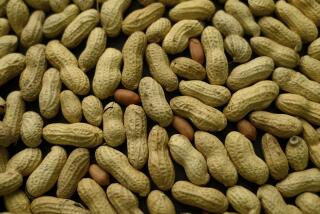Food allergies: firstborns pay a heavy price for their ranking
Being a younger sibling may mean more hand-me-downs and fewer baby photos than if you were lucky enough to be the blessed eldest child of the family. But hereâs a compensating benefit: Youâre less likely than the firstborn to suffer a allergiesâ href=âhttps://articles.latimes.com/2009/mar/16/science/sci-peanut16â target=â_selfâ>food allergy--or, for that matter, the runny nose, itchy or irritated eyes and swelling that come with allergies to such triggers as dust, pollen and pet dander.
That finding was presented this weekend in San Francisco at the annual meeting of the American Academy of Allergy, Asthma and Immunology (AAAAI). The abstract can be viewed here.
The likelihood of food allergies--an affliction that affects an estimated CDC statisticsâ href=âhttps://www.cdc.gov/media/pressrel/2008/r081022.htmâ target=â_blankâ>3 million kids in the United States -- shrinks the lower down in your family birth order your are, the study found. Surveying of the parents of 13,000 children in Japan between age 7 and 15, a group of researchers from Kyoto University in Japan found that 4% of firstborns suffered from food allergies, while 3.5% of second-borns and 2.6% of children born after that were allergic to certain foods.
Studies exploring the growth of food allergies over the past 50 years have focused on what some call the âhygiene theoryâ--that the increasingly pristine environments in which children are raised nowadays have coddled their immune systems and given rise to more immune reactions to food. The latest finding would seem to offer some further evidence for the hygiene theory, since infants born into a household populated with older siblings are more likely to have earlier and more intensive exposure to a wide range of germs from outside the home.
But the Japanese researchers noted that the differences in food allergies were evident even in infants--a fact that âsuggests...prenatal originsâ for allergies.





